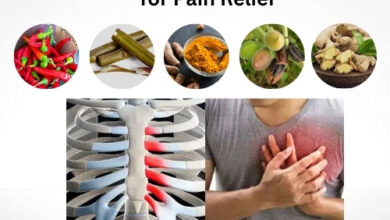Top 11 Home Remedies for Chest Pain and Tips

Chest Pain
Chest pain can take many different forms, from subtle pains to a severe stabbing feeling. Crushing or scorching sensations can occur, and in some cases, the pain extends up into the neck and jaw, then radiates to the back or down one or both limbs. Chest pain can be caused by a variety of issues, but the most serious and life-threatening ones involve the lungs and heart. Because chest pain is often a sign of a more serious problem, medical treatment should be sought as soon as possible.
Home Remedies for Chest Pain
Chest discomfort is one of the most prevalent concerns patients have when they go to the emergency room. Angina is a type of chest pain produced by a reduction in blood flow to the heart. Tightness, squeezing, heaviness, burning, and pressure behind the breastbone are all symptoms of angina. Pain in the upper central abdomen, back, neck, jaw, or shoulders; nausea; exhaustion; dyspnea; sweating; and disorientation are among the other symptoms.
The primary treatment for angina is medication recommended by a doctor; however, there are several home remedies for chest pain and angina that you can try. The following steps may assist in reducing artery blockage and reducing or eliminating chest pain completely.
Cayenne Pepper
Because of the high content of capsaicin, an anti-inflammatory ingredient, it relieves chest pain. It also acts as a blood regulator, allowing blood to flow freely back to the heart. Add one teaspoon of cayenne pepper powder to a glass of milk or fruit juice to use as a health treatment. To relieve discomfort, drink it all at once. After checking with your doctor, you can also take it as a supplement.
Basil
Basil includes magnesium, which helps the heart and blood arteries relax, making it a useful cure for chest pain. It also contains the antioxidant vitamin A, which protects blood vessel walls from cholesterol buildup. Chew 10 fresh basil leaves or drink a cup of basil tea if you’re suffering from chest pain. Take a teaspoon of fresh basil juice mixed with one teaspoon of honey daily on an empty stomach to avoid chest pain and promote heart health.
Alfalfa
Alfalfa helps to relieve chest pain by lowering cholesterol levels and plaque buildup, allowing for better blood flow to the heart. Alfalfa also has plenty of chlorophyll, which helps to soften arteries and minimise the frequency of chest pain. To drink it, combine one teaspoon of dried alfalfa leaves with a cup of boiling water to make a warm alfalfa tea. After five minutes of steeping, strain and serve. To lessen the frequency of chest pain, you can also take supplements on a daily basis.
Fenugreek
This plant extract can help to improve cardiovascular health and prevent angina. It also possesses antioxidant and cardioprotective effects that help lower cholesterol and improve blood flow to the heart. To prepare, boil one and a half cups of water with one teaspoon of fenugreek seeds for five minutes. Drink after straining and adding two teaspoons of honey. Consume soaked fenugreek seeds on a regular basis as a prophylactic step.
Almonds
Almonds, which are high in polyunsaturated fatty acids, can help lower blood cholesterol and improve heart health. It’s also high in magnesium, fibre, and plant sterols. Mix equal parts almond oil and rose oil to relieve discomfort. The ache will go away quickly if you rub it lightly across your chest. Eat a handful of roasted almonds every day to lower your risk of chest discomfort and other heart illnesses.
Drink a Hot Drink
Gas is a major source of chest pain, and consuming a warm or hot beverage may help to activate your digestive system, which helps relieve gas and bloating. Hot hibiscus tea aids digestion and heart health, as well as lowering blood pressure and lowering cholesterol and triglycerides, according to study.
Apply a Cold Pack
Chest muscular strain from weightlifting, an accident, or even carrying a child is another typical cause of heart trouble. Costochondritis (inflammation of the chest wall) is a common cause of severe chest discomfort. Applying a cold pack to the affected area several times a day can help to reduce inflammation and pain.
Apple Cider Vinegar
This vinegar promotes digestion by limiting gas production in the abdomen, resulting in a reduction in chest pain. In the event of chest pain, simply take two teaspoons of ACV.
Veggies
Instead of eating meat and dairy on a regular basis, switch to a vegetarian diet. Many of the minor symptoms of angina discomfort might be alleviated by eating less fat and cholesterol. Vegetables, particularly green ones, aid to manage angina and maintain overall health.
Citrus Fruits
Citrus fruits such as lemons, pineapples, oranges, and grapes can help you battle angina on a daily basis. Vitamin C also aids in the control of cholesterol levels.
Drink Lots of Water
Excess sodium, which causes hypertension and high blood pressure, is flushed out by water. Angina discomfort and coronary heart disease can be caused by these symptoms. Every two hours, you should drink eight ounces of water, and the average adult should consume two litres of water every day. Dehydration can cause headaches, irritability, dizziness, irregular heartbeat, and shortness of breath if you don’t drink enough water.




